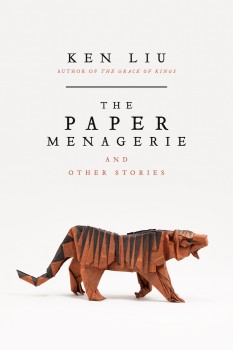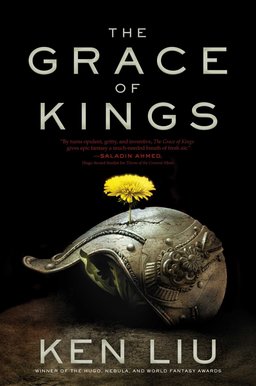The Paper Menagerie and Other Stories: An Interview with Hugo, Nebula and World Fantasy Award-Winner Ken Liu
 Ken Liu has so far been principally known for his short fiction in science fiction and fantasy, although The Grace of Kings, the first novel in his Dandelion Dynasty trilogy, has been released by Saga Press. Ken’s short fiction has been nominated for tons of awards, and he won the Hugo, Nebula and World Fantasy Awards. Recently, Saga Press also released his short story collection, The Paper Menagerie and Other Stories (which John O’Neill covered here, and about which BG blogger Amal El-Mohtar said “I have never been so moved by a collection of short fiction.”)
Ken Liu has so far been principally known for his short fiction in science fiction and fantasy, although The Grace of Kings, the first novel in his Dandelion Dynasty trilogy, has been released by Saga Press. Ken’s short fiction has been nominated for tons of awards, and he won the Hugo, Nebula and World Fantasy Awards. Recently, Saga Press also released his short story collection, The Paper Menagerie and Other Stories (which John O’Neill covered here, and about which BG blogger Amal El-Mohtar said “I have never been so moved by a collection of short fiction.”)
It features some of Ken’s most impressive work, although he’s written so much that he could have filled a few more collections of similar quality and size without any trouble. The collection contains: “The Bookmaking Habits of Select Species,” “State Change,” “The Perfect Match,” “Good Hunting,” “The Literomancer,” “Simulacrum,” “The Regular,” “The Paper Menagerie,” “An Advanced Reader’s Picture Book of Comparative Cognition” (previously unpublished), “The Waves,” “Mono no aware,” “A Brief History of the Trans-Pacific Tunnel,” “The Litigation Master and the Monkey King,” and “The Man Who Ended History: A Documentary.”
I managed to catch up with him to e-talk about The Paper Menagerie and Other Stories.
Thanks for the chance to interview, Ken. I’ve enjoyed your stories for quite a while, so I was delighted to see a collection out.
Thanks for having me, Derek! Always delighted to have a chance to chat.
One of the things I marvel at in your stories is the explosion of scope as the ideas and meaning grow. For example, at the beginning of The Waves, we’re accompanying human beings on a colonizing voyage to the stars. As the first voyagers discover they’ve been overtaken by later travelers, we get ready for one kind of story, but then you expand the diaspora, people keep moving, and the drama and the sense of wonder is in the leapfrogging and the transformation of humanity over cosmic time.
Good Hunting started as a fairy tale redone, and then suddenly, it leapt beyond expectations and became first a clash of technology and culture, and then a larger conversation on transforming ourselves. Yet the emotional core of that initial fairy tale ran throughout like a spine. How do you approach this kind of literary effect and how central is it to your initial concept for the story? What draws you to this technique as an artist?
Glad you enjoyed those stories. I’ve always liked tales that use some central metaphor as the organizing principle, for all fiction is distinguished by a rhetorical mode that prizes the logic of metaphors over the logic of persuasion.
 I don’t have a set formula for my stories. Sometimes I start out with a core image or idea, and then I build the story around it, following the expanding layers wherever they wish to go (The Waves). Other times I have in mind a specific place I want the characters to end up, and then I start as far from that place as possible and try to overcome all the obstacles in between as I get them there (Good Hunting).
I don’t have a set formula for my stories. Sometimes I start out with a core image or idea, and then I build the story around it, following the expanding layers wherever they wish to go (The Waves). Other times I have in mind a specific place I want the characters to end up, and then I start as far from that place as possible and try to overcome all the obstacles in between as I get them there (Good Hunting).
Whatever the approach, I want the speculative element to serve as a literalization of the organization metaphor, and everything else in the story is oriented toward it as the lodestar.
Because I prefer to let the story figure out where it needs to go, I don’t do a lot of planning and I don’t care very much about genre labels. Indeed, I have very little use for a great deal of the “rules” that are supposed to apply to genre stories, and if I do hear a rule, I try to forget it or break it as soon as possible.
Other stories deal with much more intimate themes; the emotional impact of the reader can be profound. I’m thinking of the pain of families who aren’t able to outgrow their conflicts and forgive. Simulacrum is a story about what happens to a family when one moment comes to define a relationship, whereas The Paper Menagerie is a struggle of language and love and pride over the course of a lifetime.
Compared to The Waves or The Litigation Master and the Monkey King, these stories feel so different in concern to me that I’d expect different creative approaches. Is that the case? If not, what sort of creative approach births stories as different as The Waves and Simulacrum?
These stories also follow my general approach of using a literalized metaphor as the foundation.
It has always fascinated me how much we claim to value empathy and yet how little we encourage or nurture it. The casual cruelty we practice upon one another, whether in the intimate setting of families or the grand arena of politics, seems to me to be the dominant note in many lives, and the source of much pain. I wanted to literalize the facets of empathy in these stories and to treasure their fragile strength.
 You play with a lot of myths. Good Hunting and The Litigation Master and the Monkey King pull in Chinese myth. The Waves weaves the creation myths of different cultures into the narrative. State Change creates its own mythology of souls and famous people. What are your favorite myths? When writers use myth, do they only borrow that cultural and thematic gravitas, or do you think that writers today can bring to the table a new way of looking at older myths?
You play with a lot of myths. Good Hunting and The Litigation Master and the Monkey King pull in Chinese myth. The Waves weaves the creation myths of different cultures into the narrative. State Change creates its own mythology of souls and famous people. What are your favorite myths? When writers use myth, do they only borrow that cultural and thematic gravitas, or do you think that writers today can bring to the table a new way of looking at older myths?
All cultures are founded on myths, and modern life hasn’t changed that at all. It’s important to remember that living myths are not static, but evolving, living tales we craft.
Our sense of what it means to be American, for example, depends on contesting and re-interpreting the foundational myths of America—our “Founding Fathers,” our original sins of slavery and conquest, our exceptionalism, our self-image as the city on the hill, the crucibles of the wars that gave us birth, the gods and heroes who laid down our republican institutions and democratic ideals like the bones and sinew of a giant upon whose body we make our home.
Or look at the myths that animate Silicon Valley: the idea that a single person, armed with a keyboard (and perhaps a soldiering iron), can transform the world with code; the belief that all problems can be reduced down to a matter of optimization, disintermediation, and “disruption”; the heroes and gods who founded the tech colossi that bestride the land while we scurry between their feet — some of us yearning to join them in a giant battle mecha of our own and others wishing to bring them down like the rebels on Hoth.
Myths are stories cultures and peoples tell themselves to explain who they are, and I think it’s natural for writers to want to participate in that myth-making enterprise and to join the age-old conversation.
I loved sense of wonder and vast sweeps of creativity in The Bookmaking Habits of Select Species. It also feels very different from your other stories. Did it feel different to you when you were in the creative process? I’d read that you drew inspiration from writers such as Calvino. What specifically attracted you to these other sources of inspiration?
 The Bookmaking Habits of Select Species is a story organized around the metaphor of writing, one of our oldest and most useful technologies. By describing a series of imaginary species and their “books,” I wanted to explore the complicated relationship between writing and thinking; between reverence for the past and casual disregard for historical atrocities; between interpretation, re-creation, translation, and misconstruction.
The Bookmaking Habits of Select Species is a story organized around the metaphor of writing, one of our oldest and most useful technologies. By describing a series of imaginary species and their “books,” I wanted to explore the complicated relationship between writing and thinking; between reverence for the past and casual disregard for historical atrocities; between interpretation, re-creation, translation, and misconstruction.
Every one of my stories captures, in some sense, the particular obsessions and enthusiasms that seized me during the period when it was composed. I think when I wrote this particular story I was feeling particularly constricted by the “rules” of how to tell a “good story.” I wanted to see if I could write a story that wasn’t a story at all.
This has been a great interview, Ken. Thanks very much for the chance to chat.
Thank you so much for the thoughtful questions! You’ve made me think, and that’s always a good thing.
If you’re looking to check out Ken Liu’s work, The Paper Menagerie and Other Stories is published by Saga Press, as is The Grace of Kings. Ken’s website is kenliu.name and he tweets from @kyliu99.
Derek writes science fiction and fantasy in Gatineau, Québec. His latest story, Flight From the Ages, is on newsstands now in the April/May issue of Asimov’s Science Fiction. He tweets from @derekkunsken.
[…] Ken Liu talked about The Paper Menagerie and Other Stories at Blackgate. […]
[…] KEN LIU INTERVIEW. Derek Kunsken has “The Paper Menagerie and Other Stories: An Interview with Hugo, Nebula and World Fantasy Award-Win… at Black […]